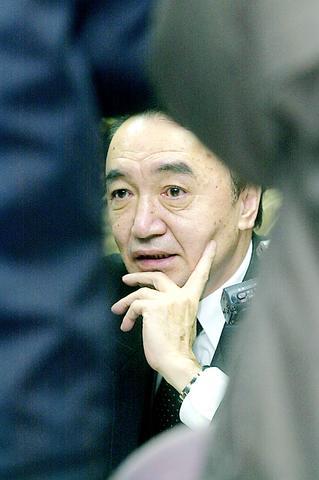Taiwan has been in the sights of Osama bin Laden's al-Qaeda terrorist organization at least four times since August, the National Security Bureau (NSB) revealed yesterday.
"We have been notified of the possible threat through various channels. Loosely-guarded facilities like Taipei's Sungshan airport are likely targets," NSB deputy director Huang Lei (

PHOTO: CHIEN JUNG-FENG, TAIPEI TIMES
Huang made the revelation at a meeting of the legislature's defense committee in response to a question from People First Party (PFP) lawmaker Lin Yu-fang (
Lin said he was happy that the NSB had confirmed the rumors about an al-Qaeda threat, but expressed concern about the military's ability to counter terrorist attacks.
Officials said the NSB had been notified of al-Qaeda's plans by countries that have intelligence exchange agreements with Taiwan. Israel is one of these countries, the officials said. The bureau did not comment on the military's ability to handle a possible threat.
Huang said the Sungshan airport was a likely target due to its lax security.
Although rumor has it that Taipei's new landmark, the Taipei 101 skyscraper, has been considered by al-Qaeda as a target for revenge attacks due to Taiwan's support for the US anti-terror campaign, Huang gave no hint whether this was the case.
Taiwan used to have several elite units dedicated to fighting terrorism, but these units have either been deactivated or greatly scaled down as part of the "Chingshih" personnel streamlining project between 1997 and 2000.
The units were small but highly combat-capable, and were attached to the army, military police and navy. Following the Sept. 11 terror attacks in the US more than two years ago, these once-forgotten special services units became useful once again in the eyes of military leaders.
Over the next few years these units will be restored to their original size, or even expanded.
The navy's special services unit is expected to be reinforced by a bomb disposal unit. The bomb disposal unit is an elite force modeled on a unit in the US navy.

The manufacture of the remaining 28 M1A2T Abrams tanks Taiwan purchased from the US has recently been completed, and they are expected to be delivered within the next one to two months, a source said yesterday. The Ministry of National Defense is arranging cargo ships to transport the tanks to Taiwan as soon as possible, said the source, who is familiar with the matter. The estimated arrival time ranges from late this month to early next month, the source said. The 28 Abrams tanks make up the third and final batch of a total of 108 tanks, valued at about NT$40.5 billion

Travel agencies in Taiwan are working to secure alternative flights for travelers bound for New Zealand for the Lunar New Year holiday, as Air New Zealand workers are set to strike next week. The airline said that it has confirmed that the planned industrial action by its international wide-body cabin crew would go ahead on Thursday and Friday next week. While the Auckland-based carrier pledged to take reasonable measures to mitigate the impact of the workers’ strike, an Air New Zealand flight arriving at Taipei from Auckland on Thursday and another flight departing from Taipei for Auckland on Saturday would have to

A group from the Taiwanese Designers in Australia association yesterday represented Taiwan at the Midsumma Pride March in Melbourne. The march, held in the St. Kilda suburb, is the city’s largest LGBTQIA+ parade and the flagship event of the annual Midsumma Festival. It attracted more than 45,000 spectators who supported the 400 groups and 10,000 marchers that participated this year, the association said. Taiwanese Designers said they organized a team to march for Taiwan this year, joining politicians, government agencies, professionals and community organizations in showing support for LGBTQIA+ people and diverse communities. As the first country in Asia to legalize same-sex

MOTIVES QUESTIONED The PLA considers Xi’s policies toward Taiwan to be driven by personal considerations rather than military assessment, the Epoch Times reports Chinese President Xi Jinping’s (習近平) latest purge of the Chinese People’s Liberation Army (PLA) leadership might have been prompted by the military’s opposition to plans of invading Taiwan, the Epoch Times said. The Chinese military opposes waging war against Taiwan by a large consensus, putting it at odds with Xi’s vision, the Falun Gong-affiliated daily said in a report on Thursday, citing anonymous sources with insight into the PLA’s inner workings. The opposition is not the opinion of a few generals, but a widely shared view among the PLA cadre, the Epoch Times cited them as saying. “Chinese forces know full well that